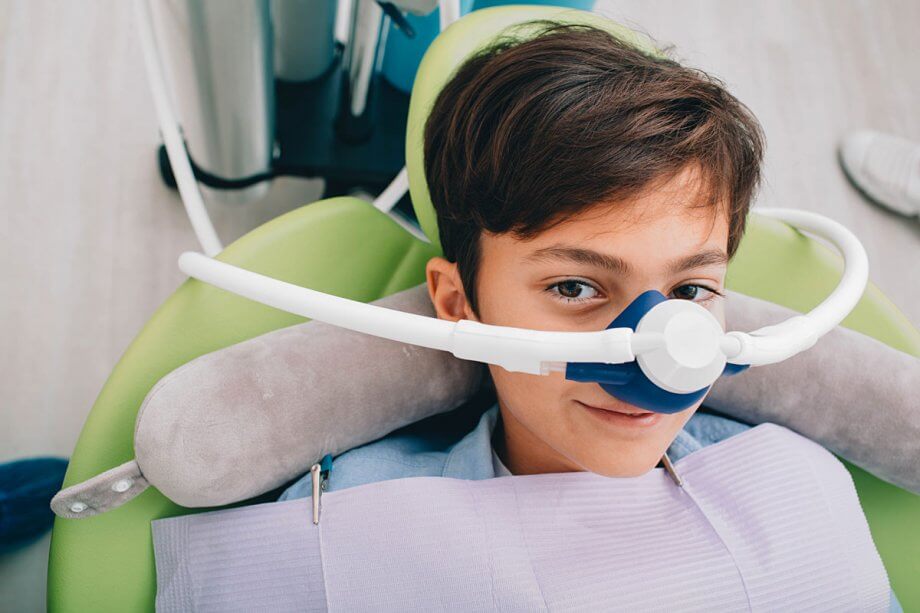Going to the dentist can make some children nervous, especially if they need a procedure like a cavity filling or oral surgery. Sedation dentistry involves methods that are used to help patients relax for dental procedures. These methods include nitrous oxide (“laughing gas”), oral sedation, IV sedation, and general anesthesia.
Does your child need a dental procedure that may require sedation? If you’re concerned about the use of sedation dentistry for your child, you are not alone. Many parents have the same concerns. But sedation dentistry is perfectly safe for children in most cases. Let’s look at the different types of sedation used for pediatric dentistry, the reasons for their use, and their safety.
Types of Sedation Used in Pediatric Dentistry
There are a few different types of sedation that can be used for children, such as:
- Nitrous Oxide. Nitrous oxide is a gas that is administered through a tube placed over the patient’s nose. A mix of nitrous oxide and oxygen is breathed in through the nose causing a feeling of euphoria and relaxation for the patient. It can even make some patients laugh or giggle, which is where the term “laughing gas” originated. Some patients also experience a tingling sensation in their feet and hands. Nitrous oxide wears off just a few seconds or minutes after the patient stops breathing it. They will be ready to resume their usual activities upon leaving the dentist’s office.
- Oral Sedation. The patient can take a pill or a liquid sedative before their procedure to help them feel more relaxed. There are a few different types of medications used for this purpose, and the one that is prescribed will depend on the patient’s health history. An oral sedative may make the patient feel sleepy, but they will still be awake for the procedure. Oral sedation will take some time to wear off after the procedure, so the patient may need to rest at home for the remainder of the day.
- IV Sedation. When a deeper level of sedation is required, intravenous sedation may be used. IV sedation will put the patient to sleep, but not fully unconscious. They will feel as if they are asleep during the procedure, but will still be able to respond to questions and requests. The patient can be brought back to consciousness quickly and will most likely not remember anything about the procedure afterwards. The patient will need to rest at home for the remainder of the day following IV sedation.
- General Anesthesia. This type of sedation is administered in a hospital setting, because the patient will be rendered completely unconscious. For safety reasons, patients under general anesthesia need to be closely monitored and will likely stay in the hospital for at least one night.
Uses of Sedation for Various Purposes
The type of sedation that is recommended will depend in large part on the procedure that needs to be done. For minor dental work, such as cavity fillings or crowns, nitrous oxide is usually all that is required. Nitrous oxide is considered to be the safest type of sedation, partly because it wears off immediately and is easy to control. There are no long term effects for most patients. Minor side effects in a very small number of patients include headaches and nausea.
An oral sedative may be prescribed for any dental procedure, but it is often used for more complex types, such as tooth extraction or oral surgery. It can also be used for patients with extreme dental anxiety or special needs for the purpose of routine cleanings and dental exams.
IV sedation is used for more complex oral surgeries, such as wisdom teeth extraction and gum grafting. It is especially helpful for longer procedures where the patient will spend a longer time in the dental chair.
General anesthesia is only used for procedures that are particularly invasive, such as jaw surgery.
Safety of Sedation Depends on the Medical History of the Patient
For most patients, sedation dentistry is completely safe. But for patients with special health conditions, there could be risks. The dentist will require a complete medical history before administering sedation to ensure that it is safe for the child.
Tender Smiles 4 Kids Specializes in Sedation Dentistry
To administer sedation, the dental team must have specialized training to ensure it is done safely. At Tender Smiles 4 Kids we have training and plenty of experience using sedation dentistry to make dental care more comfortable for children. If you have concerns, we will discuss them with you at length to ensure you are completely comfortable with your child receiving sedation before we proceed.
Contact us at any of our 4 convenient locations to schedule a consultation:

